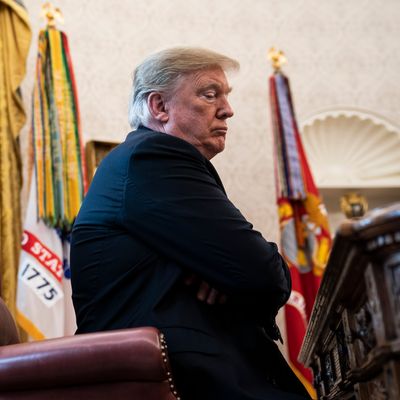
Pity the poor souls who run the legacy broadcast networks. Ratings for the collective Big Four (ABC, CBS, NBC, and Fox) keep going down, Emmy and Golden Globe voters regularly ignore their shows, and the only time those of us who write about TV for a living seem to pay attention to them is when we’re complaining about how awfully they’re doing their jobs. Right now, the networks find themselves being shamed by progressives for deciding to air President Trump’s Oval Office speech tonight. Because POTUS is a proven liar and accomplished propagandist, liberal critics argue the usual thinking — airing a presidential speech is a public service — should be reversed; not airing the address is actually the patriotic thing to do. Here’s a better idea: Broadcast networks should get out of the business of covering almost all presidential addresses and press conferences, no matter who’s living at 1600 Pennsylvania Avenue.
This might sound like an early effort to secure a spot in the 2019 Hot Take Hall of Fame, but there’s simply zero need for broadcasters to blow up their regular schedules because a politician — any politician — is giving a preplanned speech. ABC, CBS, and NBC only do so because their respective news divisions whine loudly any time their West Coast counterparts in entertainment so much as suggest that maybe there’s no need to go live for (not really breaking) news. According to multiple Los Angeles–based suits I’ve spoken with this week and over the years, the argument always seems to boil down to competition: If Network X doesn’t cover this speech or that news conference, while the other nets do, Network X will look less committed to being seen as a primary news source and its brand will suffer. This theory is not without logic, and yet it also ignores the reality that national broadcast networks are not where most Americans turn for news these days.
A 2017 Pew Research Center study showed that 64 percent of Americans stay up to date on current events via the internet, and 55 percent rely on cable news, while 51 percent check out network newscasts on a regular basis (and only 26 percent do so often). That’s not an insignificant number, of course. And it’s worth noting nightly newscasts on ABC, CBS, and NBC regularly draw more viewers than even cable superstars Rachel Maddow and Sean Hannity. The very fine and very smart journalists who work in broadcast news are not irrelevant. It’s just that, unlike as recently as 10 or 15 years ago, those networks anchors and reporters are not how most of us find out what’s going on in the world. And as such, it seems silly to suggest those who still do look to broadcast are going to stop doing so simply because they can’t watch a speech or news conference on that particular platform. Audiences turn to Lester Holt or Robin Roberts or Jane Pauley because they trust them, or they like the way broadcasts such as NBC Nightly News, Good Morning America, and CBS Sunday Morning package the day’s news. Breaking into prime-time entertainment for special reports might be good for the egos of network-news chiefs who want to pretend it’s still 1983, but it does little to build equity among news consumers.
This is particularly true since, if history is a guide, tonight’s special reports on the broadcast networks will offer relatively little analysis or commentary, if any at all. As of Tuesday afternoon, the nets are are planning to be off the air within a half-hour after Trump begins talking at 9 p.m. Eastern time. Between his speech and the Democratic response, there might be room for ten minutes of insight from network correspondents and anchors. In other words, the networks — as they have been for most recent presidential speeches — will simply act as conduits for a livestreaming video from the White House, offering little more than sound and picture widely available via multiple cable-news outlets and, of course, the internet. No real public good will be served, and no network-news division’s brand will be improved.
You could make a strong case that networks are actually doing a disservice to their core audience by interrupting tonight’s schedules. Not because they’re giving a dissembler such as Trump free airtime (though that’s not an unreasonable thought), but because broadcast networks are very much fighting for survival, or at least relevancy. In an on-demand age, it’s easy for consumers to get entertainment anywhere else but the Big Four, so every time the networks interrupt audience viewing habits, they’re risking losing a viewer to Netflix or Hulu or cable or Facebook or Twitter. Millions of viewers who were planning to watch a new episode of Dick Wolf’s freshman hit FBI tonight — something they can see only on CBS — will instead find the same Trump speech available a dozen other places.
This is not a national tragedy, but it doesn’t make much sense. Nobody expects the CW or TBS or Comedy Central to halt regular programming tonight. Netflix isn’t going to cut off your stream of Bird Box to ensure millennials see the president speak. Why should fans of Ellen’s Game of Games get just one new episode tonight instead of the two-hour premiere NBC had been promising them for weeks? Yes, broadcast nets — which use public airwaves, even though most people watch via cable — have a historic mandate to operate in the public interest. But most radio stations, which also use public airwaves, long ago gave up covering big news events because they knew TV did it better. Live streaming a speech hardly seems the best way for broadcasters to serve audiences in 2019. And yes, I’d make the same argument even if President Hillary Clinton was giving an Oval Office address tonight on her plan to guarantee free college tuition to every student.

